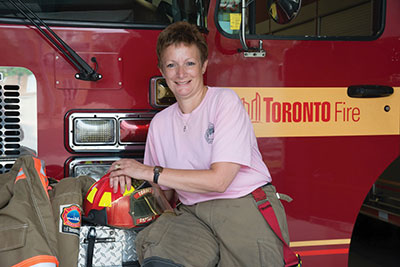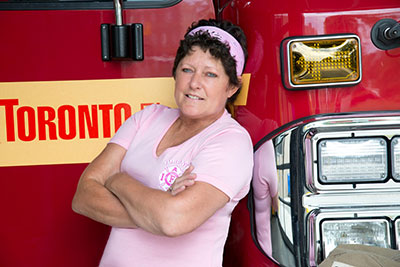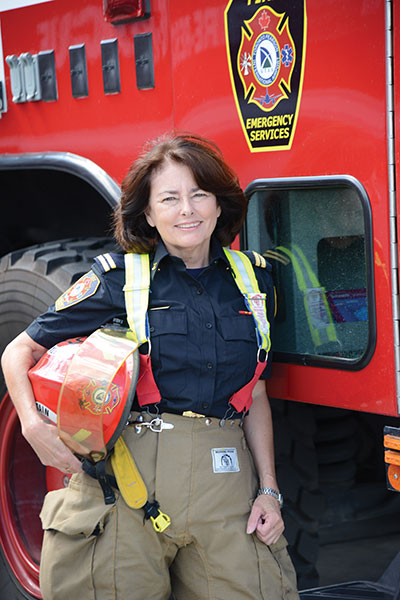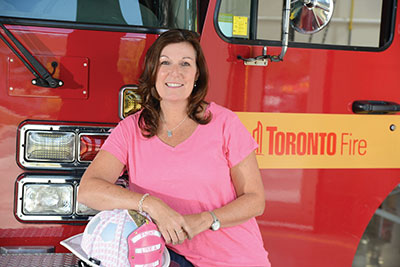
Strength of character
By Debbie Higgins
Features Health and Wellness WellnessCancer is a sensitive subject. Toronto Fire Services Deputy Chief Debbie Higgins spoke with breast-cancer survivors Rayanne Dubkov, Donna Johnson and Monica Rosmarin, who agreed to share their stories of strength and perseverance, love, and loss.
Cancer is a sensitive subject. Toronto Fire Services Deputy Chief Debbie Higgins spoke with breast-cancer survivors Rayanne Dubkov, Donna Johnson and Monica Rosmarin, who agreed to share their stories of strength and perseverance, love, and loss. The stories are poignant, and offer wisdom and insight about physical and mental health, instinct, courage, leadership and family.
 |
|
Rayanne Dubkov
Toronto Fire Services
My name is Rayanne Dubkov. I joined Toronto Fire in March 2001 and was promoted to captain in March 2013. Prior to this, I worked for Greater Manchester Fire and Rescue (England) from 1988 until 2000.
I am a healthy person; I work out regularly and watch what I eat, especially working shifts.
My nightmare started in November 2012 when I found a lump in my left breast while doing a self-examination. I made a doctor’s appointment the following day, and he scheduled me for a mammogram and ultrasound.
The results came back indicating a cyst, and advice to come back for a check up in six months. On June 12, 2013, I went for a second ultrasound, still not worrying, as they told me not to, right?
Sitting in the doctor’s office the next morning with my husband was the longest 20 minutes of our lives. The doctor confirmed I had breast cancer, which had spread to the lymph nodes. The next six weeks were a whirlwind, going from one specialist appointment to another to see how far the cancer had spread. The final result was stage-3 breast cancer and stage-2 cancer in my lymph nodes.
The tumour had grown so large that I had to have six months of chemotherapy before surgery, and then five weeks of radiation.
Chemotherapy was exhausting and it was a little alarming to see the nurses’ protection – all gowned up, masks on, double gloves to administer the drug – and you just sit there letting it go into your veins. The three days following chemotherapy I had home care during which I was hooked up to an IV for hydration for five hours a day.
Surgery and hair loss were the worst for me; I felt ugly, and those were the times when I wanted to give up. Hair loss is total-body hair loss, so eyebrows and eyelashes. Bonus though: no more shaving legs or armpits. I was told that hair loss would start approximately 12 days after the first treatment and they advised that when my hair started falling out it would be easier to shave my head rather than let it fall out in clumps, as it would be less emotional. I was in hospital when this happened so a hairdresser came to the hospital and shaved my head – that was one of the worst days for me.
The chemotherapy also affects all fast-growing cells, so it affected my fingernails and toenails; luckily, I only lost part of one toenail.
Radiation was five times a week for five weeks; the last one was Monday, April 28, 2014.
Twelve months of my life were taken up with hospital appointments, specialist appointments, and treatments.
Now it was time to get back to living, back to work, back to normality. Small things are achievements and steps closer to normality, such as having to have my eyebrows waxed and having my hair cut for the first time – and the hairdresser using a hairdryer!
It really isn’t ever over; there is always fear that it is going to come back. I have regular checkups with the oncologist. I have been told the type of cancer I had was very aggressive and I am at high risk for recurrence, so I have decided to have preventative surgery to remove the other breast followed by reconstructive surgery.
 |
|
Monica Rosmarin
Toronto Fire Services
I have been working in the fire-prevention division of Toronto Fire Services since 1994.
In June 2013 I was diagnosed with breast cancer.
I believe everybody knows their bodies and knows when things are just not right. I had symptoms for a year prior to my diagnosis. My family doctor sent me for a number of mammograms, which required follow-up tests and ultrasounds. Nothing showed except a thickening of the tissue that they were “keeping an eye on.” I eventually convinced myself it was just hormones, because the tests revealed nothing.
The pain got worse and the signs became very visible. I went to my doctor to get an X-ray for a previous ankle break. I showed the doctor my breast and within two days I was at the surgeon’s office for a biopsy. The results were positive. The cancer mass was 22 centimetres and had spread into two lymph nodes; it was never detected because I never had a lump! My surgeon, the radiologists and oncologist said they had never seen anything like this. By the time I had my surgery, the cancer had been there so long it was in my chest muscle. Following surgery, my doctors suggested I take chemotherapy followed by radiation (which was referred to as “an extra insurance policy”) even though the doctors believed they had removed all the cancer.
I have finished my treatment but continue to take tamoxifin as a preventative measure.
I am blessed and so thankful for my co-workers who worked for me because I didn’t have any sick time left due to all my clumsy adventures with broken bones, and my friends who were there laughing with and supporting me.
I have realized through this that you need to push for what you believe and be persistent with your doctors. My case was unusual, but hopefully now the doctors know what to look for when the next patient comes along.
 |
|
Donna Johnson
Greater Toronto Airport Authority
I was diagnosed with breast cancer in 1999 after serving 12 years as a firefighter and then as fire captain. When my family doctor first gave me the news, it was hard to immediately digest. I have been on my own – a single mom – for decades and both of my parents have passed on. In my fire department, I was the first female firefighter and first female captain.
A million questions were going through my mind. I had one child in university and the next one was to go the follow year – would I be able to support them? I was too young to retire; how would my work place react? Am I prepared to die?
I was lucky to have a wonderful and capable oncologist with a sense of humour. When we met, the first thing he said was that the cancer had not spread from the breast and I was not going to die (at least not from this cancer).
However, I was not so lucky with my first surgeon; he performed two operations after the biopsy, telling me that he got all the cancer and that I could return to work, but each time my oncologist saw the X-rays he sent me back for another operation. It was a rollercoaster ride of emotion until finally being told I had to have the entire breast removed – a mastectomy.
This was a terrible blow to me as a woman, being 45 and single. Although it was a shallow initial reaction, I never questioned the advice to “just get rid of them if they are going to kill you.” But that doesn’t mean I didn’t cry over the loss.
Once I stopped feeling sorry for myself, I went on the computer and read stories of other women’s struggles and what they did to handle the situations in which they found themselves. The strength of their testimony and frankness was a very powerful motivator and catapulted me into action.
I called a plastic surgeon’s office to find out what my options were after the mastectomy and was told that the best results are attained when the surgeon performing the mastectomy and the plastic surgeon are in the same operating room doing the reconstruction at the same time. This is common practice now; however, this was all new in the late 1990s.
I presented this option to my first surgeon and he was having none of it. He said that I should wait three years “to mourn the loss.” I started doing my own online research and found a team of surgeons who agreed to do reconstruction at the same time as the mastectomy.
There are options even in this procedure. You can use your own body fat to form a new breast or you can opt for an implant. In my case, I chose the latter, as the surgeons said it would be less invasive and require less recovery time.
The time span from my first diagnosis and the final reconstruction was a little over a year. I was lucky to have friends who helped me during my total of five operations and recoveries, and, of course, my children were there to help me with after-care, meals and housekeeping.
During the time I was away from work, I was reluctant to let anyone know the true reason. Women officers were still new at that time and we were always being watched to make sure we were up to the job. I had a young crew with whom I did not share intimate information. When I was initially facing only a lumpectomy, I thought I could just be off sick and that no one needed to know, but when it became more serious and I was to have a mastectomy, I told the fire chief.
I think about how I could have contracted this disease. There was cancer in the family, but no breast cancer. I was fit, working out at least five days a week, and had low body fat.
No matter what the cause, I don’t really think about my cancer that much anymore or what I could have done to prevent it. I am pleased that now there is so much more information that women can access to make better informed choices. Knowledge is the key to any good outcome and I am pleased that there is so much more information for both women and men.
 |
|
Debbie Higgins is a deputy Chief with Toronto Fire Services, the treasurer for Fire Service Women Ontario and a board member with the Ontario Association of Fire Chiefs. Contact Debbie at dhiggins@toronto.ca and follow her on Twitter at @debbiejhiggins
Print this page